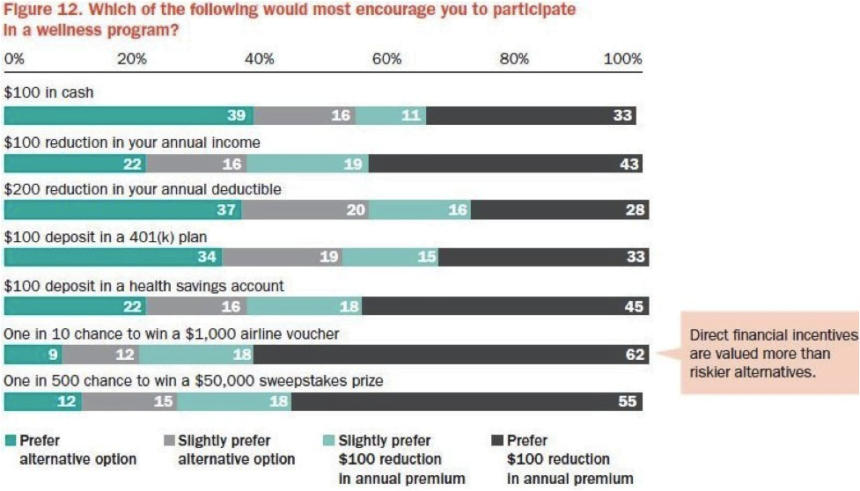EXCLUSIVE POST – Do healthier employees lead to increased productivity? Several progressive companies believe so and have committed to providing employees with programs to help engage them in a healthier lifestyle. As part of the incentives to lead a healthier lifestyle some employers have instituted a penalty and reward system tied to the companies’ benefits. For example, smokers may incur a significant surcharge to the cost of their health insurance plan while nonsmokers could see a reduction in cost.
EXCLUSIVE POST – Do healthier employees lead to increased productivity? Several progressive companies believe so and have committed to providing employees with programs to help engage them in a healthier lifestyle. As part of the incentives to lead a healthier lifestyle some employers have instituted a penalty and reward system tied to the companies’ benefits. For example, smokers may incur a significant surcharge to the cost of their health insurance plan while nonsmokers could see a reduction in cost.
According to an article in The New York Times, a growing numbers of companies including Home Depot, PepsiCo, Safeway, Lowe’s and General Mills are seeking higher premiums from some workers who smoke, similar to Wal-Mart’s addition of a $2,000-a-year surcharge for some smokers. http://www.nytimes.com/2011/11/17/health/policy/smokers-penalized-with-health-insurance-premiums.html?pagewanted=1&_r=1&ref=health
In an era of economic turmoil and escalating health care costs, companies are seeking ways to curtail spending while increasing productivity. In 2011, total health care costs per active employee, on average, are expected to reach $11,176, up from $10,387 in 2010. Employers pay 36% more for health care and employees contribute over 45% more than they did five years ago.
With pressures mounting for companies to curtail spending and for employees faced with uncertainties, “a decline in health could begin a vicious cycle of increasing out-of-pocket health care costs and stress,” reports Towers Watson. Employers may be facing an unproductive workforce with employee absenteeism. http://www.towerswatson.com/assets/pdf/3162/TowersWatson-Emp-Pers-HC-Pt2-NA-2010-18764.pdf
It’s troubling that employees are strained to the point of turning away from and managing their own health. According to Towers Watson, 59% of employees say that managing their health is a top priority; this is down 10 percentage points since 2008. Additionally, according to Towers Watson’s 2011/2012 Staying@Work Report, employers use of penalties more than doubled from 2009 to 2011, rising from 8% to 19%, and is expected to double again by 2012 when 38% of employers plan to have penalties in place. It’s reported that 12% of employers currently reward or penalize their employees based on outcomes. For example, target BMI or cholesterol levels, and an additional 16% are planning this tactic based approach for 2012.
“Employers today view health and productivity programs as integral to their overall health benefit strategy and efforts to control health care cost inflation,” said Shelly Wolff, senior health care consultant at Towers Watson,” in a press release statement. As companies strive to maximize employee participation in these programs, they are opting for both rewards and penalties. And many are finding these approaches are producing significant results.” http://www.towerswatson.com/united-states/press/5708
While the overall health and well-being of employees is a goal of employers, the main goal is to curb health costs.
Employers are frantic to find a way to curb health care costs. “As companies strive to maximize employee participation in these programs, they are opting for both rewards and penalties,” said Wolfe in the press release. http://www.towerswatson.com/united-states/press/5708
Wal-Mart and the other emerging companies feel that charging employees to pay more for unhealthy behaviors such as smoking, is the answer.
Is it the answer?
Whether it is the answer or not, companies are initiating this tactic.
I asked Matthew Holt, founder of TheHealthCareBlog and co-founder of Health 2.0 how he feels about companies like Wal-Mart initiating an out-of-pocket surcharge to employees who smoke. “It’s OK to charge smokers a small amount more so long as there is a real program to help them quit, and that amount isn’t enough to cause hardship or to prevent them from accepting offered employer based health insurance,” he said. http://thehealthcareblog.com/
If employees don’t stop smoking, they will pay financially for it. [Part 3 addresses the topic of smoking.]
Companies are committed to curbing health care costs; however, they are devoted to promoting healthier behaviors, either through penalties or rewards.
Reed Abelson reporter for The New York Times writes:
“Many programs that ask employees to meet certain health targets offer rewards in the form of lower premiums. At Indiana University Health, a large health system, employees who do not smoke and achieve a certain body mass index, or B.M.I., can receive up to $720 a year off the cost of their insurance. “It’s all about the results,” said Sheriee Ladd, a senior vice president in human resources at the system.” Source: The New York Times http://www.nytimes.com/2011/11/17/health/policy/smokers-penalized-with-health-insurance-premiums.html?pagewanted=1&_r=1&ref=health
“One in four employees would not participate in their company’s wellness program without a financial incentive.” http://www.towerswatson.com/assets/pdf/3162/TowersWatson-Emp-Pers-HC-Pt2-NA-2010-18764.pdf
It’s interesting that according to the research by Towers Watson, they found
“more than one-quarter of respondents say they must have a financial incentive in order to participate in a wellness program.” But as many as 23% of the respondents say “financial incentives aren’t important and their health isn’t a top priority.” According to the chart below, “$100.00 in cash” is preferred over vouchers and sweepstakes which would encourage employees to participate in a wellness program. However when the incentive offered is a “One in 10 chance to win a $1,000 airline voucher,” most preferred $100.00 reduction in annual premium. Encouraging wellness may prove more of a challenge for a workforce that seems resistant to a lifestyle change. Source: Towers Watson [Part 2 focuses on technology companies tapping into social networking strategies; perhaps these innovative companies can encourage individuals to manage their health and well-being.]

Source: Towers Watson
Conclusion
Companies are committed to curbing health care costs. Enticing employees with cash savings and incentives is currently gaining traction, but is that sufficient enough to encourage lifestyle changes or do companies need to supplement this with supportive programs for employees? While we agree that engaging employees to take control of their health and lifestyles is a good idea there are tools available to aid and assist a healthier lifestyle which we will explore in my next article.
[This is the first of a three part series focusing on behavioral economics. Part 1 delves into the role of the employer offering rewards and penalties to its employees and how incentives are important for the employee for wellness programs. Part 2 focuses on innovative technology companies diving into social media strategies, applications and science of behavior change and social influence. Part 3 lends itself to the individual, focusing on the issue of smoking with a Q&A, since some employers have initiated a surcharge.]
Resources:
Shaping Health Care Strategy – Employer Survey on Purchasing Value in Health Care -Towers Watson http://www.towerswatson.com/assets/pdf/3946/TowersWatson-NBGH-2011-NA-2010-18560-v8.pdf
The Smokers’ Surcharge – The New York Times
Employees Perspectives on Health Care – Part II Employee Engagement – Towers Watson
http://www.towerswatson.com/assets/pdf/3162/TowersWatson-Emp-Pers-HC-Pt2-NA-2010-18764.pdf
Use of Rewards and Penalties to Drive Employee Health Jumps During 2012 http://www.towerswatson.com/united-states/press/5708









